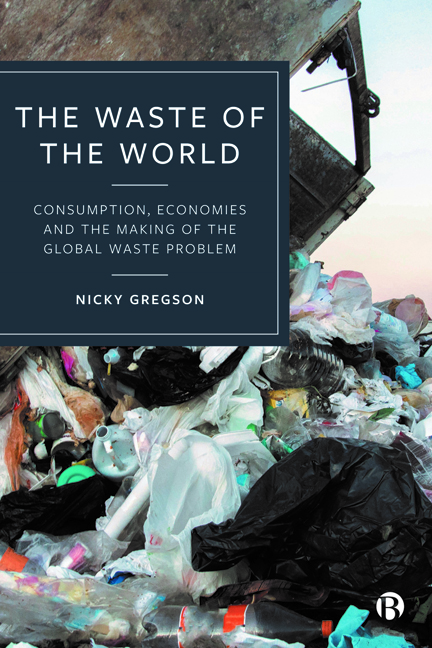Book contents
- Frontmatter
- Contents
- Acknowledgements
- Preface
- 1 The Global Waste Problem and How to Think about It: Or, how to understand the ‘too much waste’ problem
- 2 Discard, Social Order and Social Life: Or, discard is foundational to understanding waste
- 3 Consumption, Consumer Practices and Consumer Discard: Or, how consumer discard relates to economies
- 4 Conduits, Value Regimes and Valuation: Or, following consumers’ discarded things
- 5 Recommodifying Discard: Or, the challenges of turning discard into an economic good
- 6 Waste, Money and Finance: Or, how turning discard into waste turns waste into an energy resource and an asset
- 7 Future Directions: Or, rewiring waste through the three Ds (decarbonization, digital and discard)
- Notes
- References
- Index
2 - Discard, Social Order and Social Life: Or, discard is foundational to understanding waste
Published online by Cambridge University Press: 18 January 2024
- Frontmatter
- Contents
- Acknowledgements
- Preface
- 1 The Global Waste Problem and How to Think about It: Or, how to understand the ‘too much waste’ problem
- 2 Discard, Social Order and Social Life: Or, discard is foundational to understanding waste
- 3 Consumption, Consumer Practices and Consumer Discard: Or, how consumer discard relates to economies
- 4 Conduits, Value Regimes and Valuation: Or, following consumers’ discarded things
- 5 Recommodifying Discard: Or, the challenges of turning discard into an economic good
- 6 Waste, Money and Finance: Or, how turning discard into waste turns waste into an energy resource and an asset
- 7 Future Directions: Or, rewiring waste through the three Ds (decarbonization, digital and discard)
- Notes
- References
- Index
Summary
Although waste is often described as that which is discarded, the relationship between discard and waste is complex and incommensurate. What is discarded does not inexorably become waste. Conversely, much of what is discarded does become waste, if not directly then certainly indirectly. Yet discard is prior to waste – for something, anything, to become waste it must first be discarded. So, to understand waste, we first need to understand discard, not simply as the stuff that is discarded but, more importantly, as an act of discarding. The act of discarding is psychological, social, cultural, economic and material, and always spatial and geographical. But before we can explore these dimensions and their relationship to discard and discarding, there is a need to step back further.
I want to begin this chapter with what might seem at first sight a provocative statement, especially for a book that is about waste. This is that discarding is hard-wired into us humans, just as it is for many species. Discarding is what we do; it's part of what makes us human and what it is to be human. This needs to be recognized and acknowledged, especially when devising interventions that seek to minimize or reduce waste. But unlike other species – think of birds separating husks from seed as they eat and dropping them to the ground, or cleaning up their nests by picking out their guano and dropping it overboard – human discard is qualitatively different from that of other species. It is more than organic. So, it transcends the discards of those material fundamentals of life: food, edibility, eating and its material consequence, shit. Indeed, human discard can comprise literally anything that humans live with and around. In the academic field of discard studies, discard even encompasses humans themselves, in the form of discarded places and discarded people, or those places and people abandoned and/or left behind, sometimes as a result of political unrest, conflict and turmoil, but often as a result of transformations in economies. Indeed, the field of discard studies is so all-encompassing that its orbit includes not only this but also much of archaeology, in the form of abandoned settlements and buildings, as in ruins.
- Type
- Chapter
- Information
- The Waste of the WorldConsumption, Economies and the Making of the Global Waste Problem, pp. 31 - 51Publisher: Bristol University PressPrint publication year: 2023



